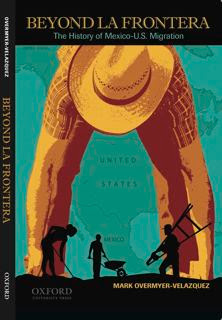She looked to me and said, 'see? why do people move from one country to the next?'
Well, if people just moved when they were looking for more money, there would be way more people moving. There are people living in poor places all over the world, even within the country. But only a fraction of them emigrate. First, people usually make decisions on a family level. When does it make sense to move away to support the family?
Migration is usually really expensive and a giant risk. You are spending money to go somewhere to work where your experience doesn't count as much as people that grew up there. So the cost of going has to be low.

What keeps the cost of immigrating low? When the two countries have a history! For example, after the US invaded Mexico in 1846, American capital--especially railroads-- moved across the border. American recruiters had been going to Mexico to recruit low-wage workers in the 19th century and early 20th. From 1942 to 1964, a government program, the Bracero Program, sponsored 4.5 million border crossings to bring Mexican laborers to American fields. For France, the colonies also share a common historical infrastructure. With the excuse of a trade dispute-fueled insult to a France consul, they invaded in 1830. And French citizens and capital moved into Algeria. Algeria became three full-fledged departements by 1848, making Algeria formally part of France.
These two examples show how the costs of migration can drop: the (American and French) governments invaded, and led an influx of capital (when accompanied by legal shifts) that changed the economic links between the countries. When the US and France looked for manpower in their fields and factories, they actively recruited from Mexico and Algeria, respectively. Why are we surprised that people from those countries have migrated, when we asked them to start coming in the first place?
And once a lot of people come over to the industrialized country, other people are less disoriented when they arrive. Compatriots provide information about jobs, help to find a place to sleep, and
 can speak your language.
can speak your language.If your family has enough money and connections to make the initial trip, and the country has an economic/political/military connection with where you're headed, then you might emigrate when your family feels economic instability.
People get on the train only after the tracks have been laid, so to speak, by government and capital. That makes the trip more feasible, and the reception at the train station more welcoming.